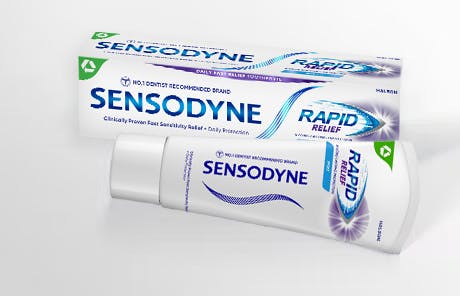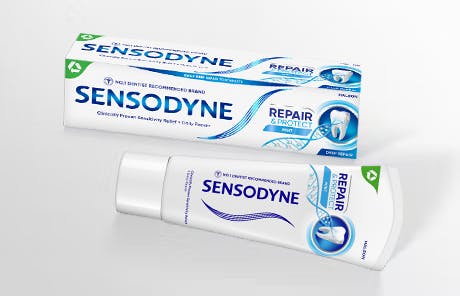
Common Dental Problems Explained
Learn about some of the most common dental and oral health problems with our helpful guide. Discover the typical symptoms, causes and treatment options for oral health conditions including tooth sensitivity, enamel erosion, gum disease, dry mouth and persistent bad breath, with Sensodyne.
If you’re experiencing dental problems or symptoms of oral disease, being able to recognise these issues early on can help to make sure that you receive the right treatment and prevent them from becoming more serious. If you think you may be suffering from any of the following oral health issues, speak to your dentist.
TOOTH SENSITIVITY
Dentin hypersensitivity is a common oral health condition. If you have sensitive teeth, you may often experience discomfort or a short, sharp pain when the affected teeth are exposed to extreme temperatures – for example, when eating or drinking hot or cold foods and beverages (such as ice cream or soup), brushing your teeth, or breathing in cold air; all of which can make daily life very uncomfortable.1
Tooth sensitivity can be caused by several different oral health issues and conditions, including tooth decay, cracked teeth, worn tooth enamel or fillings, receding gums or gum disease. It occurs when the tooth enamel (the hard, protective outer layer of our teeth) is worn away, exposing the nerves and cells in the dentin beneath to heat, cold and acid.1,2
Luckily, tooth sensitivity can be treated with Sensodyne Rapid Relief. Learn more about tooth sensitivity and how to care for sensitive teeth with Sensodyne.
ENAMEL EROSION
It’s not just sugary treats that can cause dental problems. Did you know that foods and beverages that are high in acid can also damage the enamel that protects your teeth, and even cause it to wear away?
Everyday things like soft drinks, sports drinks and flavoured tea, as well as citrus fruits and juices, can all contribute to enamel erosion. Some of the most common signs of eroded enamel are increased tooth sensitivity and yellowish discolouration of your teeth. Eventually, enamel erosion can also increase your risk of developing cavities or an oral infection.3
Unfortunately, once your tooth enamel is worn away, it can’t repair itself naturally. Only a dentist will be able to treat enamel erosion.2 But the good news is that erosion can be easily prevented with a good oral health routine. Learn more about enamel erosion and how to help prevent it. Sensodyne Pronamel has been specifically designed to help protect tooth enamel against the effects of acid erosion.

GUM DISEASE
Gum disease is a very common oral health condition. In fact, most adults in the UK have gum disease to some degree, and the majority of us will experience it at least once during our lives. In its earliest stages (known as gingivitis), gum disease can cause red, swollen and bleeding gums – particularly when brushing or flossing your teeth. Gingivitis can be painful, but not always, so it’s important to be on the lookout for these other symptoms, too.4
Left untreated, gum disease can cause serious oral health problems. Gingivitis can progress to periodontitis, a more aggressive stage of gum disease that can cause bad breath, an unpleasant taste in your mouth and gum recession (where gums pull back from the teeth). Eventually, it can lead to gum abscesses, loose teeth, and even tooth loss.4
Just like sensitivity and enamel erosion, gum disease can be prevented, and even reversed in its early stages, with a good oral health routine and regular dental check-ups.4
DRY MOUTH
You may be wondering why dry mouth (‘xerostomia’) is a dental issue. Essentially, it comes down to the importance of saliva for our oral health. Not only does saliva help us to break down and swallow food, it also acts as our mouth’s natural cleanser. Saliva helps to fight tooth decay by naturally washing away the acids that cause enamel erosion, as well as gum disease-causing plaque bacteria.5
Occasional dry mouth is common (especially if you’re dehydrated), but when it becomes a persistent problem, it could be a sign of an underlying medical condition, such as diabetes or Sjögren's syndrome. Dry mouth can also be a side effect of certain medications. If you’re experiencing persistent dry mouth, speak to your doctor or dentist so that they can properly diagnose the cause.6
BAD BREATH (HALITOSIS)
Chronic bad breath (known as halitosis) can be an embarrassing and unpleasant condition. And unfortunately, it can’t simply be solved by brushing your teeth a little longer or chewing on a mint.
Persistent bad breath that won’t go away can be the result of an underlying oral health problem, such as an infection in the mouth, nose or throat; dry mouth (often exacerbated by smoking tobacco); or gum disease. Dental problems like cavities can also contribute to bad breath by creating spaces in your mouth for odour-causing bacteria to become trapped.7
If you’re experiencing bad breath that won’t go away, speak to your dentist about the possible causes. In the meantime, ensure you’re brushing twice daily with a toothpaste like Sensodyne Daily Care Extra Fresh, to help keep your smile feeling fresh.
Discover the full Sensodyne range today.
References: Clicking any of the links below takes you to an external website that is independently operated and not managed by Haleon. Haleon assumes no responsibility for the content on the website. If you do not wish to leave this website, do not click on the links below.
- Sensitive teeth: Causes and Treatment. American Dental Association. https://www.ada.org/~/media/ADA/Science%20and%20Research/Files/patient_33.pdf?la=en. Accessed 09/07/20
- Tooth. Mouth Healthy. https://www.mouthhealthy.org/en/az-topics/t/tooth. Accessed 09/07/20.
- Dietary Acids and Your Teeth. Mouth Healthy. https://www.mouthhealthy.org/en/az-topics/e/dietary-acids-and-your-teeth. Accessed 09/07/20.
- Gum disease. NHS. https://www.nhs.uk/conditions/gum-disease/symptoms/. Accessed 09/07/20.
- Dry mouth. Oral Health Foundation. https://www.dentalhealth.org/dry-mouth. Accessed 09/07/20.
- Dry mouth. NHS Inform (Scotland). https://www.nhsinform.scot/illnesses-and-conditions/mouth/dry-mouth. Accessed 09/07/20.
- Halitosis. Mouth Healthy. https://www.mouthhealthy.org/en/az-topics/h/halitosis. Accessed 09/07/20.







